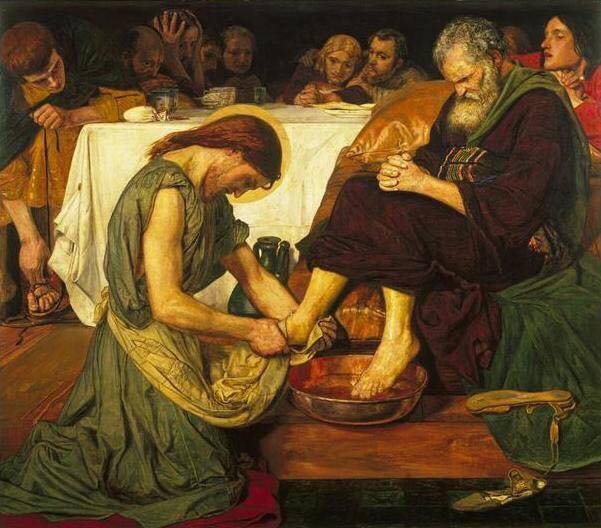Variety-show entertainers generally prefer to end their productions with a spectacular and climactic final act that leaves their audience cheering for an encore. Jesus obviously wasn’t an entertainer; nevertheless, when one considers the impressive miracles, healings, and other outstanding feats that characterized his years of active ministry, one would perhaps expect that his final act before his arrest and execution would be spectacular and leave his disciples with little doubt about his true identity. Instead, his final act was anything but spectacular or awesome. On the contrary, he thoroughly astounded his disciples (and even scandalized the likes of Peter) with his simple yet profound act of washing their feet.
That this should be one his final lessons to his disciples suggests that it is one he considered crucial and imperative in the life of those who would be his disciples. Now although some extraordinary feat might have been the appropriate way to bring his earthly ministry to a climactic conclusion, perhaps it actually was spectacular—something that Peter may have intuitively reacted to with his initial refusal to allow his feet to be washed. For, to perform some powerful and miraculous action would certainly have been in keeping with his divine nature; but that their Lord and Master, (who was both divine and human) should stoop down and bathe his disciples’ feet, is perhaps more astonishing than some miracle defying the laws of nature.
Important also, is Jesus’ instruction that if I, therefore, the Master and Teacher, have washed your feet, you ought to wash one another’s feet. Earlier, Peter had declared his willingness to lay down his life for Christ—a noble gesture that seems more in keeping with truly honoring our heavenly Master and Teacher, than the mundane act of washing feet! And yet, this rather unexpected insistence on the part of Jesus is affirming two important truths about the authentic disciple of the Master. The first is that no one lacks the capacity for truly honoring and serving Christ. For, the washing of feet is symbolic of any sincere gesture of loving concern that we extend to one another—no matter how small. Conversely, the grand (and even heroic) gesture, while seeming to be more noble and impressive, can all too easily be fueled by pride, vainglory, and the desire to draw attention to oneself and receive admiration and praise.
The second truth about Jesus’ instruction on washing each other’s feet is that true virtue and holiness permeates the entire person and is expressed in every word and action—the small and seemingly insignificant, no less than the grand and astounding. This, in turn, alerts us to the fact that the willingness to wash each other’s feet reflects a permanent and continuous openness and generosity, able to respond whenever and wherever a brother/sister is in need—not only on rare occasions and in spectacular circumstances. In this, (strangely enough) we are actually manifesting signs of our growing divinization! For, if God is Love, then becoming divine is inseparable from this unfailing availability and loving concern for one another—symbolically expressed by the willingness to wash one another’s feet.
And so, if you are looking for signs of holiness (either in yourself or in others) don’t be searching for the miraculous or the extraordinary. Yes, many saints did perform amazing feats through their powerful intercession, but these were the exception. It was in the small, “everyday,” and seemingly insignificant loving actions and gestures that their true holiness was manifested and that identified them as true disciples of the Lord and privileged sharers in his divinity. Such sanctity is surely something we can realistically aspire to as we seek to imitate our humble Lord and God whose washing of his disciples’ feet was both ordinary and extraordinary, commonplace and yet, in its own way, miraculous!
